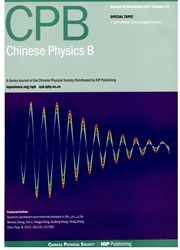

 中文摘要:
中文摘要:
Using the first-principles method of the plane-wave pseudo-potential, the structural properties of the newly-discovered willemite-II Si3N4(wII phase) and post-phenacite Si3N4(δ phase) are investigated. The α phase is predicted to undergo a first-order α→ wII phase transition at 18.6 GPa and 300 K. Within the quasi-harmonic approximation(QHA), the α→ wII phase boundary is also obtained. When the well-known β→γ transition is suppressed by some kinetic reasons, the β→δ phase transformation could be observed in the phase diagram. Besides, the temperature dependences of the cell volume, thermal expansion coefficient, bulk modulus, specific heat, entropy and Debye temperature of the involved phases are determined from the non-equilibrium free energies. The thermal expansion coefficients of wII–Si3N4 show no negative values in a pressure range of 0–30 GPa, which implies that the wII–Si3N4 is mechanically stable. More importantly, the δ-Si3N4 is found to be a negative thermal expansion material. Further experimental investigations may be required to determine the physical properties of wII- and δ-Si3N4 with higher reliability.
 英文摘要:
英文摘要:
Using the first-principles method of the plane-wave pseudo-potential, the structural properties of the newly-discovered willemite-Ⅱ Si3N4 (wⅡ phase) and post-phenacite Si3N4 (δ phase) are investigated. The α phase is predicted to undergo a first-order α→wⅡ phase transition at 18.6 GPa and 300 K. Within the quasi-harmonic approximation (QHA), the α→wⅡ phase boundary is also obtained. When the well-known β→γ transition is suppressed by some kinetic reasons, the β→δ phase transformation could be observed in the phase diagram. Besides, the temperature dependences of the cell volume,thermal expansion coefficient, bulk modulus, specific heat, entropy and Debye temperature of the involved phases are determined from the non-equilibrium free energies. The thermal expansion coefficients of wⅡ-Si3N4 show no negative values in a pressure range of 0-30 GPa, which implies that the wⅡ-Si3N4 is mechanically stable. More importantly, the δ-Si3N4 is found to be a negative thermal expansion material. Further experimental investigations may be required to determine the physical properties of wⅡ- and δ-Si3N4 with higher reliability.
 同期刊论文项目
同期刊论文项目
 同项目期刊论文
同项目期刊论文
 Periodic DFT study on the structural and thermal properties of bulk anti-fluorite magnesium silicide
Periodic DFT study on the structural and thermal properties of bulk anti-fluorite magnesium silicide Logarithmic entropy of Kehagias-Sfetsos black hole with self-gravitation in asymptotically flat IR m
Logarithmic entropy of Kehagias-Sfetsos black hole with self-gravitation in asymptotically flat IR m Combined constraints on modified Chaplygin gas model from cosmological observed data: Markov Chain M
Combined constraints on modified Chaplygin gas model from cosmological observed data: Markov Chain M 期刊信息
期刊信息
